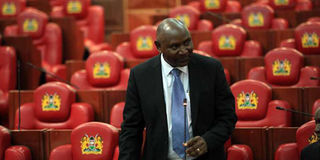Breaking News: At least 10 feared to have drowned in Makueni river
Auditor General asks for extension of reports' submission time

Auditor General Edward Ouko appears before the Public Accounts Committee in Parliament on August 13, 2015. Article 229 (4) of the Constitution provides that the Auditor General is required to audit and report within six months after the end of each financial year, in this case June 30. PHOTO | EVANS HABIL | NATION MEDIA GROUP
What you need to know:
- Article 229 (4) of the Constitution provides that the Auditor General is required to audit and report within six months after the end of each financial year, in this case June 30.
- The six-month constitutional timeline is meant to deal with executive mischief that saw former Auditor and Controller Generals sit on audit reports for years.
- Despite the challenges, the consolidated annual report of the Auditor-General is one of the most eagerly awaited reports, with the growing anticipation that it will settle the debate on the use of the Sh250 billion Eurobond proceeds.
Auditor General Edward Ouko is calling for a rethink of the constitutional deadlines within which the Kenya National Audit Office (Kenao) should present its reports to Parliament.
Mr Ouko spoke as he also disclosed that his report for the last financial year would incorporate an audit of projects undertaken by the controversial Eurobond proceeds “if it has been appropriated in 2014/15 projects.”
“I don’t have just one report to deliver under the new Constitution. They are, a consolidated national report and two annual reports per county; that is, over 95 reports, not to mention individual reports for each MDA (Ministries, Department and Agencies) and over 175 corporations! It’s not practical to expect these within six months,” Dr Ouko said.
Article 229 (4) of the Constitution provides that the Auditor General is required to audit and report within six months after the end of each financial year, in this case June 30.
It means the reports for the last financial year should be ready by the end of January this year.
Parliamentary Public Accounts Committee Chairman Nicholas Gumbo (ODM) also said the Auditor General was still within the constitutional timelines.
“The Auditor General is largely within the constitutional timelines. Preparing Annual Accounts is a very interactive process involving thousands of AIE (Authority to Incur Expenditure) holders and hundreds of accounting officers within government. The timeliness for presentation presuppose co-operation of all these officers. Unfortunately, this doesn’t always happen,” Mr Gumbo said.
The six-month constitutional timeline is meant to deal with executive mischief that saw former Auditor and Controller Generals sit on audit reports for years.
Relaxing the timelines for Dr Ouko may not be easy, given the manner the executive has been dealing with his office, especially after he exposed that the Jubilee administration spent Sh67 billion in unsupported expenditures in the 2013/14 financial year.
CONFLICTING REACTIONS
The bulk of the unaccounted for funds, Sh22 billion, was at the Ministry of Health headed by Mr James Macharia, who has since been moved to the Transport and Infrastructure docket.
The executive also sponsored a Public Audit Act that stripped Dr Ouko’s office off its independence in recruiting staff.
The function now resides with the Public Service Commission (PSC). In addition, the Act gives the National Treasury powers to decide the budget allocation for the Office of the Auditor General.
Following publication of the audit, Dr Ouko said some of his officers had received death threats.
There were also complaints by cabinet secretaries that the report does not give the true picture.
They also accused Dr Ouko of carrying out an audit that fell short of international standards.
Despite the challenges, the consolidated annual report of the Auditor General is one of the most eagerly awaited reports, with the growing anticipation that it will settle the debate on the use of the Sh250 billion Eurobond proceeds.
The opposition Cord has claimed that the Jubilee administration cannot account for more than Sh88 billion raised from the international bond floated in 2014.
But the government maintains that all the money received in Kenya was distributed among various ministries.
National Treasury Cabinet Secretary Henry Rotich, in December 2015, reneged on his pledge to lay bare the details of the mega spending at the centre of the political row with opposition leader Raila Odinga.
NO TANGIBLE EXPLANATION
Mr Rotich then said line ministries were the custodians of their spending and are accountable to Parliament — effectively exonerating his department from responsibility over use of the Eurobond proceeds.
Dr Ouko said the “usage (of the Eurobond proceeds) would be part of development budget/projects audit.”
“If it has been appropriated in 2014/15 projects, then on sheer materiality basis, the related projects would be audited. That notwithstanding, Parliament has (also) requested a special audit,” he said.
The Eurobond controversy has persisted for months now.
On Thursday, a live public debate between government bureaucrats, economists and the business community at the University of Nairobi turned into a sanitising affair, with the moderators deviating from the pressing issues.
The Kenya Private Sector Alliance (Kepsa), whose members organised the debate, appeared unconcerned whether taxpayers lost their money, and were instead worried over the negative publicity the country had received following the loan.
Treasury PS Kamau Thuge was still unable to explain how the money received from the Eurobond proceeds was spent, but insisted that no money was stolen.
Additional reporting by Vincent Achuka





